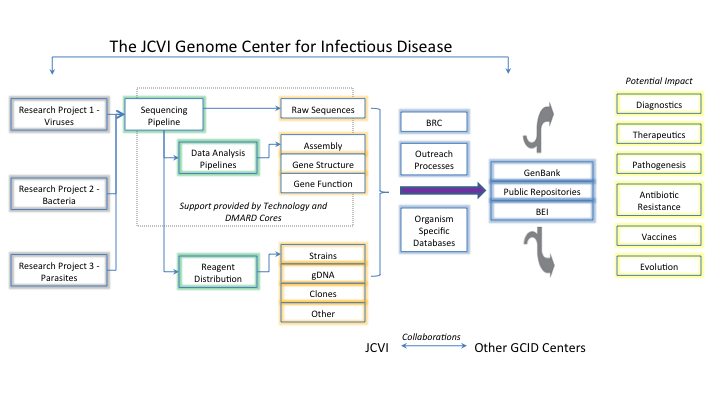About the Genomic Center for Infectious Diseases
Overview
The J. Craig Venter Institute (JCVI) Genomic Center for Infectious Diseases (GCID) was established by the National Institute for Allergy and Infectious Diseases (NIAID) to develop basic knowledge of infectious disease biology through the application of DNA sequencing, genotyping and comparative genome analysis. The central theme of the JCVI GCID is the application of innovative genomics-based approaches to study pathogens and determinants of their virulence, drug-resistance, immune evasion, and interactions with the host and with host microbiome to advance research in pathogenicity, drug-resistance, disease transmission, and vaccine development. Projects used cutting edge sequencing platforms, and comparative approaches for analyzing the sequence of key pathogenic organisms and closely related species.
The GCID contract continued a previous initiative of Genomic Sequencing Center for Infectious Diseases (GSCID), awarded in 2009 and Microbial Sequencing Center (MSC), awarded in 2003. The JCVI GCID was one of three such centers. The two other such centers are at the Broad Institute and the Institute for Genome Sciences (IGS) at the University of Maryland School of Medicine.
Both data and new analytical tools generated by the GCID are shared publicly to advance research in pathogenicity, drug resistance, disease transmission and vaccine development. Data generated from the sequencing and genotyping projects are released to the scientific community in accordance with the NIAID's data and reagent sharing and release guidelines.
The JCVI was selected to participate in this grant because of our expertise in genome sequencing, annotation, and analysis.
Key JCVI Personnel

William Nierman, PhD
Professor, Infectious Disease Group

Hernan Lorenzi, PhD
Protozoan Project Director; Assistant Professor

Granger Sutton, PhD
DMARD and Bioinformatics Core Director; Professor
Citations
All Publications that use data generated and/or are supported by the Sequencing Center at JCVI should acknowledge the sponsor as follows: "Research reported in this publication was supported by the National Institute Of Allergy And Infectious Diseases of the National Institutes of Health under Award Number U19AI110819. The content is solely the responsibility of the authors and does not necessarily represent the official views of the National Institutes of Health."
The long-range objective of the J. Craig Venter Institute (JCVI) Genomic Center for Infectious Diseases (GCID) was to develop basic knowledge of infectious disease biology through the application of genomic technologies. JCVI has been engaged in this research field since our founding in 1992. The Program is based on the application of innovative genomics-based approaches to study pathogens and determinants of their virulence, drug-resistance, immune-evasion and interactions with the host, and interactions with the host microbiome. The Program was built on our experience as an NIAID Microbial Sequencing Center (MSC) and Genomic Sequencing Center for Infectious Diseases (GSCID).
Core Leaders
Core A: Administration
Dr. Karen E. Nelson; President of JCVI
Dr. William Nierman; Professor, Infectious Diseases
Core B: Technology
Dr. Granger Sutton; Professor, Project Director
Core C: DMARD
Dr. Granger Sutton; Professor, Project Director
GCID Activities
Below is an overview of the Center's capabilities illustrating the key components, major activities and outputs and potential impacts.

Technology Core, and the Data Management, Analysis and Resources Dissemination (DMARD) Cores
The Center is supported by the Technology Core, and the Data Management, Analysis and Resources Dissemination (DMARD) Cores which:
- Provide high throughput, high quality, and low cost genomic sequencing and genotyping services that generate a variety of publicly available genomic data for a diverse set of projects.
- Assemble and annotate genomes as well as analyzing genotype data.
- Identify, evaluate, and implement new sequencing and genotyping technologies.
- Integrate data with other infectious diseases resource centers.
- Collaborate with basic and clinical infectious diseases scientists and their communities.
- Maintain community collaborations through technical workshops.
- Educate and train infectious diseases scientists on GCID tools and methods.
Sequencing
The appropriate technology and platform for each project will be selected based on the genomic diversity of the organism being studied, the organism and strains being sequenced/genotyped, and/or the scientific questions being asked. The GCID will leverage a combination of MiSeq, NextSeq, HiSeq, IonTorrent, PacBio and MiniION Oxford Nanopore sequencing platforms while continuing to identify, evaluate, and implement appropriate new sequencing technologies into the sequencing production pipelines.
Bioinformatics
GCID data generation and processing is managed and supported by a sophisticated bioinformatics systems, including a Laboratory Information Management System, automated pipelines for quality control of sequence data, genome assembly and finishing, and automated and manually-assisted annotation. In addition, the ontologies based metadata tracking system (OMeta) has been enhanced. Informatics tools and infrastructure also underpin the genotyping data generation and analysis pipelines. All laboratory and data analysis pipelines are modular by design, highly automated, and managed by sophisticated custom software allowing efficient handling of very large volumes of data. The DMARD Core releases tools and pipelines under an open source plan to the community according to NIAID data sharing and release guidelines.
Open-Source Bioinformatics Tools
GCID Personnel
Principal Investigators
Dr. Karen E. Nelson; President of JCVI
Dr. William Nierman; Professor, Infectious Diseases
Project Directors
Dr. Gene Tan, Project Director, Assistant Professor, Infectious Diseases; Project 1 – Viruses
Dr. Derrick Fouts, Project Director, Professor; Project 2 – Bacteria
Dr. Hernan Lorenzi, Project Director, Assistant Professor, Project 3 – Parasites
Dr. Ganger Sutton, Project Director, Professor, Technology and DMARD
Core Leaders
Core A: Administration
Dr. Karen E. Nelson; President of JCVI
Dr. William Nierman; Professor, Infectious Diseases
Core B: Technology
Dr. Granger Sutton; Professor, Project Director
Core C: DMARD
Dr. Granger Sutton; Professor, Project Director
Project leaders are drawn from faculty in the departments of Environmental & Sustainability, Infectious Disease, Human Health, and Informatics.


